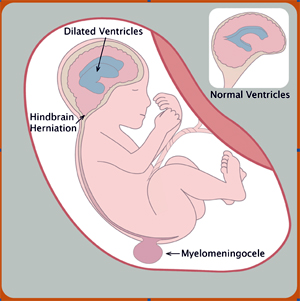
The study, which followed 158 women at three hospitals - Vanderbilt University Medical Center in Nashville, the University of California-San Francisco and Children's Hospital of Philadelphia - found that if a baby is operated on while still in the uterus before 26 weeks gestation, serious complications of a form of spina bifida, myelomeningocele, can be lessened. Fetal surgery decreased the need for shunting at 12 months for the infants in the study, and nearly half were able to walk without crutches by age two-and-a-half.
"This is a landmark study because it is the first to show the significant benefits of fetal surgery to unborn babies with spina bifida," said KuoJen Tsao, MD, pediatric surgeon at Children's Memorial Hermann Hospital, assistant professor of surgery at UTHealth, and co-director of The Fetal Center, where the first fetal surgery/EXIT procedure in Houston was performed in 1999. "The study shows that we can do something early on to affect the outcomes of patients with spina bifida, and it offers hope to so many families."
"At our center, we were developing the program 10 years ago to perform fetal surgery for spina bifida but stopped because we were eagerly awaiting the results of this trial," Dr. Tsao continued. "These positive results show a real, beneficial option for children with spina bifida through prenatal surgery. We are now moving forward with our program and offering this therapy to patients in Houston and the region. We are currently screening patients."
A common birth defect of the spine, spina bifida occurs in 3.4 out of every 10,000 live births in the United States and is the most common permanently disabling birth defect. There is no known cure.
If a spina bifida pregnancy is carried to term, the newborn needs an operation within days to repair the spinal cord defect. In fetal surgery, doctors perform this procedure while the baby is still in the womb.
"This study is exciting because it is the first to show that fetal surgery may result in greatly improved neonatal outcomes," said Dr. Joan Mastrobattista, maternal-fetal medicine specialist, professor of obstetrics and gynecology at UTHealth, and co-director of the center.
"When performing fetal surgery, there are risks to the mother and the pregnancy, and those risks must be weighed carefully prior to proceeding," Dr. Mastrobattista continued. "The risk of preterm birth and surgical complications should be discussed with the patient and her family. Patients should consult a comprehensive center that offers a multidisciplinary team of specialists."
The Fetal Center is a multi-disciplinary team of maternal-fetal, pediatric and neonatal specialists working together in an integrated program to care for high-risk pregnancies with congenital anomalies. It is the only institution in the region that offers specialized care for high-risk pregnant mothers and their babies at one facility. Since 1999, the highly-skilled team has been providing comprehensive fetal therapy to the city of Houston. The center is one of only seven clinical centers nationwide that is a member of both the Neonatal Research Network and the Maternal-Fetal Medicine Units Network.